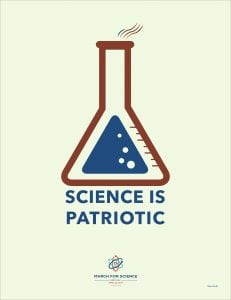Humans are not unique in living communally, working cooperatively, using tools, investigating the world around us, or even communicating.
Cumulatively, however, these characteristics have allowed us to achieve remarkable things that set us apart from all other species on Earth: We create tools of astonishing complexity, engineer new structures and re-engineer entire environments, develop medical techniques to extend and
improve lives, create breathtaking works of art, prepare exquisite culinary delights, and then use our unparalleled linguistic ability to discuss these advances, record them for posterity, learn from them, and work towards an even more successful future.
All of this is facilitated by science, “the state of knowing: knowledge as distinguished from ignorance or misunderstanding…a department of systematized knowledge…knowledge or a system of knowledge covering general truths or the operation of general laws” (Merriam-Webster).
For most of us, the word “science” probably brings to mind images of spaceships and flasks full of mysterious chemicals and Petri dishes housing microscopic life forms, but these are only some of the many wonderful physical embodiments of the concept. A fully inclusive visualization would require us to expand our minds’ eyes to encompass nearly all aspects of our collective human culture, from the foods we eat (our ancestors’ experiments determined which could be safely eaten, how their flavour could be improved through different types of preparation, which varieties could be domesticated, and how those domestic yields could be made greater and more quickly) all the way through to the art we appreciate in museums (thanks to our distant relatives who first discovered how to mix liquid with pigments to make paint, how to strengthen clay by exposing it to fire, how to extract metals from ores and then fashion them into useful and decorative implements, how to use mathematical rules to create aesthetically pleasing layouts, and so on). These are only a few examples of topics about which we are in a “state of knowing”, and about which we have learned through a process of experimentation and observation.

When you think of it like this, science sounds not just fundamental, essential, fascinating, and enjoyable, but also laudable; it sounds like an achievement that we should celebrate and protect and promote. It certainly doesn’t sound as though it should be controversial—though particular disciplines and applications might be uncommonly thought-provoking— and you wouldn’t think that “science”, “scientist”, or “scientific” could ever be used in a negative way.
And yet, the recent March For Science (MFS) campaign saw citizens around the world uniting to voice their support for a beleaguered ideal that has— especially in recent months— been attacked, misrepresented, misunderstood (sometimes deliberately), and suspiciously questioned. Over 800,000 scientists and science-lovers have joined a March For Science Facebook group where they can share pro-science anecdotes and coordinate pro-science activities. The MFS movement is not the first or only such effort, but it feels particularly poignant and meaningful. It seems to capture the zeitgeist very effectively: having despaired over the tone and style of science coverage in the press, watched stagnation or even backward progress around prominent and hugely impactful issues such as climate change and vaccinations, seen science and education-related budgets repeatedly slashed, and endured a growing vocal opposition to intellectualism in general, science supporters are now ready to take matters into their own hands and push back.

The prominence of the March for Science activities has encouraged and shined a spotlight on wider discussions around the role of science in society, and, in particular, around the intersection of science and politics—the latter of which can be defined as “the art or science of government or guiding/influencing governmental policy…the total complex of relations between people living in society” (Merriam-Webster).
Although scientific research should be performed systematically, objectively, and without bias, the people, the process, and the outcomes can all become politicized—and this is by no means exclusive to contemporary societies. Galileo, for example, was punished in the 17th century for advocating Copernicanism because this belief was seen to undermine the power of the Catholic church by challenging the veracity of the Bible; officials feared this theory because if one portion of the Scripture was proven to be false, others might be equally tenuous, and suddenly the Church might find itself lacking in authority. That famous example is a negative form of politicization, but others are more positive. In the early 1960s, US president John F Kennedy delivered two notable speeches in which he publicly declared a belief that Americans could and should reach the Moon by the end of the decade. The source of the goal—political and technological competition with Russia—may not be a source of scientific pride, but the resulting innovations and achievements certainly were, and still are; Kennedy linked intellectual accomplishment with Americans’ sense of identity, in the process promoting inspirational goals and respect for both research and ideas.
Scientists are, of course, only human—with opinions and preconceptions and motives and desires—but they are humans who, by and large, typically strive to be aware of these characteristics (within the context of their work, at least) and compensate for them so as to maximise the chance of obtaining unequivocal insights about the universe; we’d all rather be remembered as a Ptolemy than a Copernicus, after all, so it does pay to be rigorous.

That said, careers, fortunes, and clout can all be influenced by the outcomes of scientific research, and so there will always be examples of impropriety— faked datasets, for example, or falsehoods and misdirection associated with conducting or interpreting studies (e.g., the case of Trofim Lysenko, discussed in Loren Graham’s recent book Lysenko’s Ghost). Scandals and public disagreements are damaging not just to those involved directly, but to all scientists and even science in general, since the public quickly loses faith in truth-seekers who seemingly can’t be trusted to tell the truth themselves. When this is combined with scientists’ innate desire to question and debate each new result, it creates an easy target for anyone wishing to paint science as unreliable and deceitful.
Those of us who know and love science—who engage in it, seek out opportunities to learn about it, teach it, look for ways to apply it to our daily lives in practical ways, interact with professional researchers, and advocate it to others—understand that its greatest strength is also its greatest weakness: Science can both reveal and obscure in one fell swoop. The old aphorism is true: The more you know, the more you know you don’t know. As physicist and science communicator Professor Brian Cox said in a recent interview, “The value of science is in embracing doubt…
is not a collection of absolute truths. Scientists are delighted when we are wrong because it means we have learnt something” (Strom 2017).
Unfortunately, there are many people who take advantage of this pursuit of uncertainty and negated hypotheses—people who wilfully misconstrue the often repetitive and cyclical nature of the scientific process as being indicative of disorganization, confusion, and an inability to make progress.
These are the sorts of people who deny that climate change is occurring and is caused by anthropogenic activity; these are the sorts of people who try to prevent science teachers from discussing evolution in the classroom. When these are also the people holding elected positions in which they make decisions about national priorities, policies, and research funding schemes, personal ignorance becomes public misfortune.

Many of the scientists whose studies helped usher in the creation of the atomic bomb— Oppenheimer, Einstein, and Meitner prominent among them—were painfully aware of the potential consequences of their work, and stridently argued for world leaders to act with diplomacy and restraint. Recently, Japanese scientists have boycotted a military funding scheme in a similar show of reluctance to have their research weaponized or otherwise used to the detriment of whatever fellow humans might be deemed “enemies of the state” at some point in the future (Cyranoski 2017). These are extreme examples of how science can be politicized— and of how scientists can recognize that process—but recent events have shown, in particularly stark detail, that science is always politicized in some way or another (Naro and Francis 2017). Research is conducted by people who have grown up in particular cultures with particular ways of seeing and doing things; it is funded by patrons and institutions and governments with particular agendas; it is carried out within organizations and societies and countries with specific goals; it depends upon the ability of expertise, results, and progress to flow unimpeded across borders; it thrives on collaboration and openness rather than secrecy.
Although many of us may once have believed that science is apolitical—“having no interest or involvement in political affairs; having no political significance” (Merriam-Webster)—the past few months have been a reminder that the impact of politics on science can be immense; now we have the opportunity to show that the reverse can be true as well.
The popularity of the March For Science message shows that scientists are both frightened and galvanized by the current global political landscape. Although it is empowering to gather en masse with like-minded individuals and physically demonstrate our support for a scientific way of life, we will need to keep working long after April 22nd has come and gone. We must continue to speak out against misconceptions, advocate and advertise science.
We must work with the press to achieve more informative, less sensationalistic coverage of scientific news. We must contact politicians to advocate pro-science activities and attitudes. If government officials fail to represent our interests, we must vote them out at the next election. If we worry about finding candidates who have sufficient expertise, we must consider stepping forward ourselves. None of this will be easy, but no one person has to do it all. As the MFS Facebook group shows, the pro-science community is both vast and varied. Each of us can play to our individual strengths and, together, work towards a more fruitful synergy of science and politics; whatever personal debates we may have with each other in private, we need to be supportive and unified in public. We must be passionate, inspiring, clear, and persuasive. Above all, we must be persistent; as Galileo found many hundreds of years ago, the way to combat small-mindedness is with irrepressible science—not silence.
References:
Cyranoski, D. 2017. Japanese scientists call for boycott of military research. Nature. https://www.nature.com/news/japanesescientistscall- for-boycott-of-militaryresearch- 1.21779. Accessed on April 21, 2017.
Science. 2017. Merriam-Webster. com. https://www.merriamwebster.com/. Accessed on April 21,2017.
Naro, M and M Francis. 2017. Science is political. The Nib. https:// thenib.com/science-is-political. Accessed April 21, 2017.
Strom, M. 2017. Professor Brian Cox on elections: ‘Don’t vote for politicians who say they have all the answers’. The Sydney Morning Herald. https://www.smh.com.au/technology/sci-tech/professor-brian-cox-onelectionsdont-vote-for-politicians-whosay- they-have-all-theanswers- 20170403-gvc6hu.html Accessed April 21, 2017.






